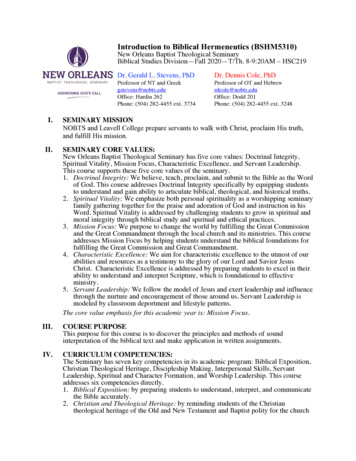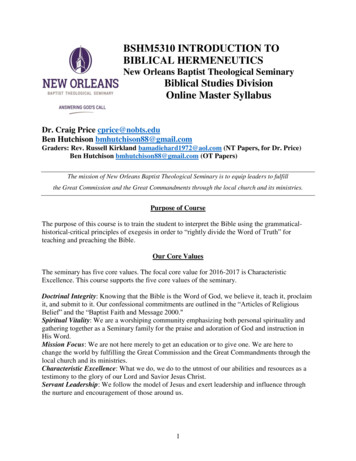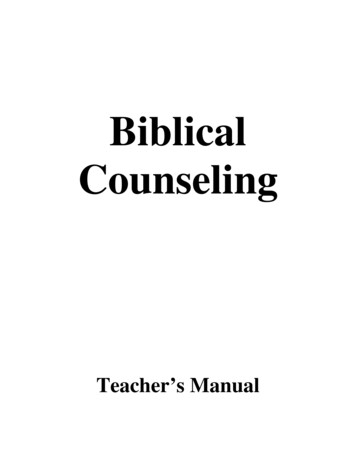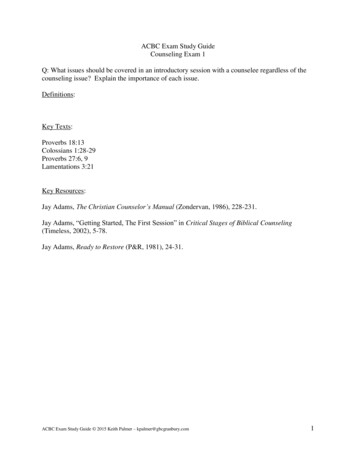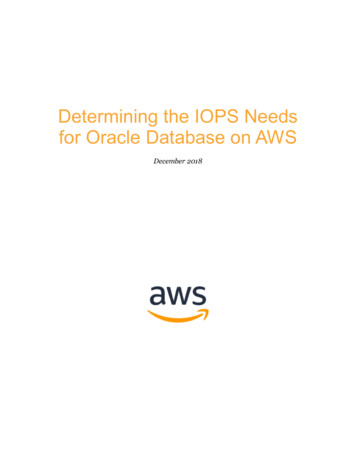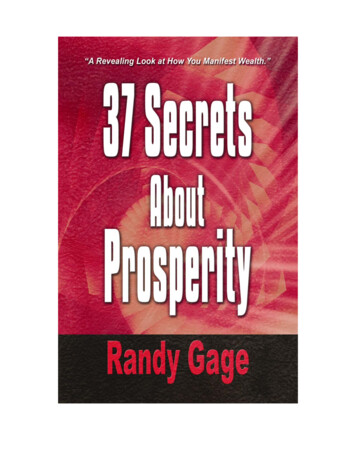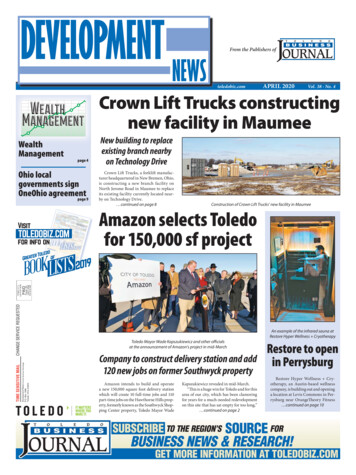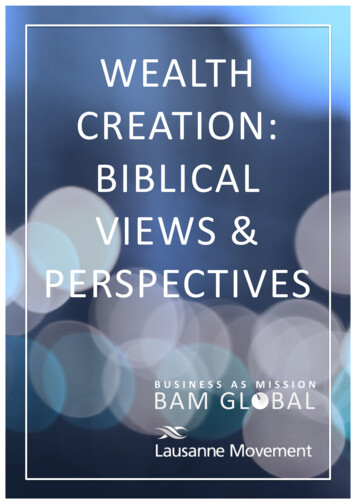
Transcription
WEALTHCREATION:BIBLICALVIEWS &PERSPECTIVES
WEALTH CREATION:BIBLICAL VIEWS &PERSPECTIVESGlobal Consultation onWealth Creation forTransformationMarch 2017lausanne.org bamglobal.org
WEALTH CREATION: BIBLICAL VIEWS &PERSPECTIVESA paper from the Global Consultation onWealth Creation for Transformationorganized by the Lausanne Movement and BAM Globalin Chiang Mai, Thailand, in March 2017. Lausanne Movement & BAM GlobalPermission is granted to distribute this paper for personal and educational use,free of charge. Commercial use is prohibited.Please include this acknowledgement when sharing and quoting:2017 Global Consultation on Wealth Creation for Transformation; LausanneMovement & BAM Global.We encourage the dissemination of this paper and also the varioustranslations of the Wealth Creation Manifesto.Global Consultation on Wealth Creation for Transformation Series: Wealth Creation and the Poor Role of the Church in Wealth Creation Wealth Creation: Biblical Views and Perspectives Wealth Creation and the Stewardship of Creation Wealth Creation within Global Cultural Perspectives Wealth Creators' Contribution to Holistic Transformation Wealth Creation and JusticeFor more information contact: info@lausanne.org info@bamglobal.org
TABLE OF CONTENTSForeword . 5Wealth Creation Manifesto . 7Executive Summary – Wealth Creation: Biblical Views & Perspectives . 9Wealth Creation: Biblical Views & Perspectives. 101.0 Introduction. 102.0 Analysis of the concepts of wealth and holistic transformation . 113.0 Biblical foundations . 154.0 Contentious issues. 295.0 Conclusion . 436.0 Resources . 43Appendix . 46Endnotes . 504
Foreword‘Remember the LORD your God, for it is he who gives you the ability to produce wealth’ (Deut8:18).The Bible talks about wealth in three ways; one is bad and two are good. Hoarding of wealthis condemned. Sharing of wealth is encouraged. Creation of wealth is both a godly gift and acommand, and there is no wealth to be shared unless it has first been created. But all toooften the issue of wealth creation is misunderstood, neglected, or even rejected. The samething applies to wealth creators.The Global Consultation on The Role of Wealth Creation for Holistic Transformation aimedat addressing that. We were about 30 people from 20 nations, primarily from the businessworld, and also from church, missions and academia. During the Consultation process 2016 –2017 we discussed various aspects of wealth creation, including justice, poverty, biblicalfoundations, culture, wealth creators, stewardship of creation and the role of the church.The findings have been summarized in the Wealth Creation Manifesto, and will also bepublished in several reports and a book, as well as an educational video.All these contain a wealth of knowledge and insights, based on the Scriptures, rooted inhistory and informed by present-day conversations and examples.Gold in the ground has no particular value until it is discovered, extracted, and traded. Usingthe metaphor of mining let me mention three ‘goldmines’ that we have sought to dig intoduring our Consultation process.The biblical goldmineFrom the Manifesto: ‘Wealth creation is rooted in God the Creator, who created a world thatflourishes with abundance and diversity. We are created in God’s image, to co-create withhim and for him, to create products and services for the common good. Wealth creation is aholy calling, and a God-given gift, which is commended in the Bible.’ There is a lot more goldto be found in the biblical goldmine.The historical goldmineWealth creation leading to transformation is not new. From the Manifesto: ‘Wealth creationthrough business has proven power to lift people and nations out of poverty.’ There are manystories of holistic transformation through wealth creation throughout history, and some arestill untold. Wealth creation has a history and we need to explore it further. Through ourreports you can dig into historical gold mines.5
The global goldmineWealth creation is not a Western or rich-world phenomenon. Many men and women aremaking a difference through businesses on all continents. From the Manifesto: ‘Wealthcreators should be affirmed by the Church, and equipped and deployed to serve in themarketplace among all peoples and nations.’ We need to learn from them and others and toextract the global gold, also found in these reports.Discover and extract the intellectual wealth in the Manifesto, the reports and books aswell as the video, and let them add value to your life and work. Share with others.Please start by reading the Wealth Creation Manifesto. It will give you a context and aframework to better understand each report. Please also see the appendix Consultation onWealth Creation: Background and Context.Mats TunehagChairman of the Convening Team6
Wealth Creation ManifestoBackgroundThe Lausanne Movement and BAM Global organized a Global Consultation on The Role ofWealth Creation for Holistic Transformation, in Chiang Mai, Thailand, in March 2017. About30 people from 20 nations participated, primarily from the business world, and also fromchurch, missions and academia. The findings will be published in several papers and a book,as well as an educational video. This Manifesto conveys the essentials of our deliberationsbefore and during the Consultation.Affirmations1. Wealth creation is rooted in God the Creator, who created a world that flourisheswith abundance and diversity.2. We are created in God’s image, to co-create with him and for him, to create productsand services for the common good.3. Wealth creation is a holy calling, and a God-given gift, which is commended in theBible.4. Wealth creators should be affirmed by the Church, and equipped and deployed toserve in the marketplace among all peoples and nations.5. Wealth hoarding is wrong, and wealth sharing should be encouraged, but there is nowealth to be shared unless it has been created.6. There is a universal call to generosity, and contentment is a virtue, but materialsimplicity is a personal choice, and involuntary poverty should be alleviated.7. The purpose of wealth creation through business goes beyond giving generously,although that is to be commended; good business has intrinsic value as a means ofmaterial provision and can be an agent of positive transformation in society.8. Business has a special capacity to create financial wealth, but also has the potentialto create different kinds of wealth for many stakeholders, including social,intellectual, physical and spiritual wealth.9. Wealth creation through business has proven power to lift people and nations out ofpoverty.10. Wealth creation must always be pursued with justice and a concern for the poor, andshould be sensitive to each unique cultural context.7
11. Creation care is not optional. Stewardship of creation and business solutions toenvironmental challenges should be an integral part of wealth creation throughbusiness.AppealWe present these affirmations to the Church worldwide, and especially to leaders inbusiness, church, government, and academia.1 We call the church to embrace wealth creation as central to our mission of holistictransformation of peoples and societies. We call for fresh, ongoing efforts to equip and launch wealth creators to that veryend. We call wealth creators to perseverance, diligently using their God-given gifts toserve God and people.Ad maiorem Dei gloriam—For the greater glory of God8
Executive Summary – Wealth Creation: Biblical Views & Perspectives[Quotes in italics are excerpts from the report, unless otherwise stated.]This paper explores biblical perspectives on the theme of ‘wealth creation for holistictransformation’: its biblical meaning, basis, purpose, and implications. It first looks at thevery meaning of these terms—what is meant by ‘wealth’ and by ‘holistic transformation’. Itthen moves on to examine the biblical foundations for wealth creation, observing thatwealth creation is rooted in God the Creator (Genesis 1 and Psalm 104) who purposed us toexpress his creative nature through work and carrying for the garden (Genesis 2).There is, however, good work and bad work, good business and bad business. Thus thispaper next explores biblical principles for ‘good’ business. In doing so, it focuses on theconcepts ‘shalom’, the ‘common good’ and a business’ ‘proper purpose’—a purpose which isfar broader than simply maximizing return on investment.The subject of wealth and economics is full of thorny issues. These cannot and should not beavoided. Thus, the paper goes on to tackle three contentious issues: partnership with nonChristians in business, simplicity as command or calling, and shared-rewards in the capitalisteconomic system.Regarding partnership with non-Christians, the two sides—warnings and encouragements,be in the world but not of it—are both presented. Regarding the question of whethersimplicity is a command for all or rather a calling for some, this paper argues strenuously forthe latter. And finally, regarding the subject of shared-rewards, the writer here looks at thebusiness implications of 1 Corinthians 9:9-10, ‘For it is written in the Law of Moses: “Do notmuzzle an ox while it is treading out the grain.”’ The apostle Paul was clear that this biblicalinjunction was never meant merely for animals. It can and should be applied to business,this paper suggests. Doing so, might well alleviate many of the tensions currently tearingapart our societies worldwide.9
Wealth Creation: Biblical Views & PerspectivesRod St. Hill, Roberto Costa de Oliveira, Paul Miller, Tetsuya Morita, Dong-Ho Song, TimWeinholdIt has been aptly stated:Had the followers of Jesus remained an obscure Jewish sect, most of you would nothave learned to read and the rest of you would be reading from hand-copied scrolls.Without a theology committed to reason, progress and moral equality, today theentire world would be about where non-European societies were in, say, 1800: Aworld with many astrologers and alchemists but no scientists. A world of despots,lacking universities, banks, factories, eyeglasses, chimneys, and pianos. A worldwhere most infants do not live to the age of five and many women die in childbirth.2To be sure, we must be taught by Scripture on such matters as baptism, prayer,election, and the church, but Scripture speaks centrally to everything in our life andworld, including technology and economics and science.31.0 IntroductionWealth creation since the Industrial Revolution is a relatively new phenomenon compared tothe long period in human history when there was little economic progress and most of theworld’s population could not aspire to much better than subsistence. In a paper published in2000, Richard Easterlin argued the following turning points in many countries in thenineteenth and twentieth centuries:By many measures, a revolution in the human condition is sweeping the world. Mostpeople today are better fed, clothed, and housed than their predecessors twocenturies ago. They are healthier, live longer, and are better educated. Women’slives are less centred on reproduction and political democracy has gained a foothold.Although Western Europe and its offshoots have been the leaders of this advance,most of the less developed countries have joined in during the 20th century, with thenewly emerging nations of sub-Saharan Africa the latest to participate. Although thepicture is not one of universal progress, it is the greatest advance in the condition ofthe world’s population ever achieved in such a brief span of time.4Easterlin presented data from five countries (Brazil, France, Japan, Sweden, and the UnitedKingdom) that showed a turning point in life expectancy occurring one to two generationsafter a turning point in growth of real gross domestic product (GDP). The exception wasIndia in which the turning points in life expectancy and real GDP both occurred in 1945, wellafter the others.The historical data support the idea that improvements in what Easterlin referred to as thelevel of living lead to improvements in the standard of living that embraces many otherindicators including life expectancy. For the Christian, the historical data point to the10
possibility that God gave humanity the creative capacity and resources to create wealth, notfor its own sake, but for a purpose, that of holistic transformation. This paper is focused onexploring biblical views and perspectives on wealth creation and holistic transformation.That biblical principles are associated with the rapid improvement in standards of living isapparent in the aforementioned quote from Rodney Stark. The other quote above makesthe point that the Bible5 speaks to all areas of life, including economic life.1.1 BackgroundLittle is known about wealth in the Roman Empire at the time when Jesus lived on earth. Wedo know that per capita gross domestic product (GDP) around that time was approximatelyUSD 700 at 1990 purchasing power (about USD 1,300 in 2016). The elites of the day,including the senatorial order, the equestrian order, civic notables, wealthy landowners, andother wealthy people comprised only 1.2 to 1.5 percent of the population, but accrued 15 to30 percent of the total income. Upper level non-elites comprised some seven to 13 percentof the population and accrued 15 to 25 percent of total income. Lower level non-elitescomprised the vast majority of the population (84 to 90 percent) and they accrued about 22percent of the total income with at least 10 to 22 percent living at starvation level. The Ginicoefficient was between 0.42 and 0.44 (the closer to zero is the Gini coefficient, the moreequal is distribution).6 There can be little doubt that many of the followers of Jesus andmembers of the early church were very poor indeed. Paul’s collection for the Christians inJerusalem in AD 57 (2 Cor 8 and 9) was motivated by their poverty, the result of over 20years of intense persecution by the Jews.Contemporary nations with a Gini coefficient in the range of the first century Roman Empireinclude Argentina, Burundi, Chad, Ghana, Israel, Kenya, and Russia.7 Contemporary nationswith per capita GDP equivalent to the Roman Empire in Jesus’ time include Chad, Haiti,Madagascar, Malawi, Niger, Sierra Leone, Tanzania, and Zimbabwe.82.0 Analysis of the concepts of wealth and holistic transformationThis section of the paper is devoted to exploring the concepts of wealth and holistictransformation. Biblical and lay concepts of wealth are compared, and the contribution ofthe Business as Mission movement to the idea of holistic transformation is noted. Asemphasised in section 1, it is important to remember that the Lausanne Consultationprocess focused on the case for wealth creation for holistic transformation, not wealthcreation for its own sake. The former recognises explicitly that God is concerned for the poorand oppressed whereas the latter does no such thing. Wealth creation for its own sake is notbiblical. Followers of Jesus would do well to remember that God told Israel he had giventhem the power to create wealth for the purpose of confirming his covenant (cf Deut 8:18).11
2.1 WealthBiblically speaking, wealth is a concept embodying strength, power, riches, and substance.Sometimes ‘riches’ and ‘wealth’ occur together, but they are synonymous, and really serveto reinforce each other—a common feature in ancient writing. Strength and power areindicative of an owner’s legal right to use or dispose of possessions for private benefit. Thisis broadly in line with the contemporary definition of wealth in terms of accumulatedfinancial and real net assets (‘substance’). Laypersons often use the terms wealth (a stockconcept—at a point in time) and income (a flow concept—over a period of time)interchangeably, but in the interests of precision, wealth is regarded as the value of netassets (gross assets minus gross liabilities) of an entity such as a business, household, orindividual. The concept may also be applied to nations. Enderle suggested that the wealth ofa nation includes ‘the total amount of economically relevant private and public assetsincluding physical, financial, human and “social” capital’.9 Enderle also suggested that wealthcreation is fundamentally about making something new or better. He goes on to say, ‘Aimingat material improvement for the benefit of human lives, wealth creation includes both amaterial and a spiritual side and goes beyond the mere acquisition and accumulation ofwealth. It is a qualitative transformation of wealth’.10 He gave provided examples of wealthcreation on a national scale, such as Germany and Japan after World War II and China afterthe Cultural Revolution of 1966 – 1976. An example on a smaller scale is the development ofCyrus McCormick’s mechanical reaper described by Vishal Mangalwadi. Motivated byneighbour-love, McCormick sought to develop machinery that would alleviate the drudgeryof farm labour. He did just that when he invented a mechanical reaper. Not only did herelieve thousands of farm labourers from the drudgery of scythe and sickle, but his machinecreated wealth through farm businesses. Mangalwadi points out that it was not necessitythat was the ‘mother’ of this invention, but it was the love of for his fellow man thatmotivated him.11According to the Global Wealth Report 2016,12 published by Credit Suisse, global wealth wasUSD 256 trillion as at June 2016 (adjusted for exchange rates). Wealth was unevenlydistributed, with the bottom half of wealth holders accounting for less than one percent ofglobal wealth and the top ten percent accounting for 89 percent of global wealth. Therewere 21 million people in the United States who were in the lowest global wealth quintile.Interestingly the lower income nations of the Asia-Pacific region contributed some 25percent of the growth in global wealth between 2000 and 2016, which was greater than thehigh-income nations of the Asia Pacific and not much lower than the high-income nations inEurope.The ‘wealth pyramid’ for 2016 shows that the world distribution of wealth is highlyconcentrated. Over 73 percent of the world’s population held USD 10,000 or less in wealth(at current exchange rates), comprising just 2.4 percent of the world’s wealth. A tiny 0.7percent of the world’s population held USD 1 million or more in wealth, comprising nearly 6percent of the world’s wealth. The global Gini coefficient was 0.927.1312
Figure 1: Wealth Pyramid, 201614It is known that the distribution of wealth is more concentrated than distribution of income.The National Bureau of Economic Research published one of the earliest works on globalwealth distribution. The Gini coefficient for global wealth for 2000 was 0.892 (at currentexchange rates), compared to an estimate for income of 0.795 in 2005.152.2 Holistic transformationHolistic transformation is a concept that needs some discussion. Mats Tunehag developed adiagram in 2006 that has influenced thinking in the global Business as Mission (BAM)movement, which is reproduced below.1613
Figure 2: Holistic transformation17The areas of transformation are identified as ‘business bottom lines’ in the diagram, namelyeconomical (profit), social, environmental and spiritual. The first three are embraced by theconcept of corporate social responsibility (CSR), but the addition of the spiritual bottom lineemphasizes the important fact that holistic transformation involves eternal as well astemporal considerations. Furthermore, the diagram explicitly includes followers of Jesus asbeing stakeholders, along with business owners and other stakeholders.One potential problem of interpretation of Tunehag’s figure is that the spiritual bottom linemight be interpreted as additive, allowing for dualistic separation of CSR as secular. Adamsand Raithatha provided an important insight in their discussion of CSR :In a limited business paradigm the primary or sole focus is on maximizing profit forthe owners. The growing corporate social responsibility (CSR) movement emphasizesaccountability to society as a whole for the ‘triple bottom‒line’ impact of social andenvironmental outcomes as well as financial results. BAM affirms all of these but alsoincludes a 4th bottom-line, intentionally revealing and honoring Christ and seeing Himtransform lives through business. BAM is CSR , as it were. The can also be seen as across—putting everything under the Lordship of Christ.18Adams and Raithatha also argued thus:Broadly, and perhaps crudely, speaking, in the pre-modern period the Church shapedsociety, in the modern period the nation state shaped it and in the contemporary, orpost-modern, world society is shaped by business . . . . If it is business that shapes the14
world, then why can’t the Church work in and through business to shape the worldfor good and for God?19Tunehag noted three important correlates in relation to the need for holistic transformation:1. Most unreached peoples are found in the Muslim, Hindu and Buddhist world. Mostof them live in the so called 10/40 Window.2. Here you will also find a large percentage of the world’s poorest of poor.3. These areas often have very high unemployment rates of up to 50 percent.20These correlates imply that the wealth-creating capacity of business is a key to achievingboth temporal and eternal outcomes. Tunehag argued that BAM offered a new paradigm formission, one in which entrepreneurs and business people establish profitable andsustainable businesses that focus on all four bottom lines. BAM is about business with aKingdom-of-God-perspective, purpose, and impact and is an example of the quote fromWolters at the top of this paper.3.0 Biblical foundationsIn this section biblical foundations for wealth creation and holistic transformation areexplored. The foundation for discussion of contentious issues in section 4 are establishedhere. This paper argues that wealth creation is rooted in God the Creator of the heavens andthe earth and, as such, must be cognisant of humans as being created in his image and of therest of creation as having significance and status in God’s eyes. The impact of the Fall isaddressed. It is suggested that business is a power originally intended by God for the benefitof humanity. This raises the issue of what constitutes ‘good’ business, and that is explored indepth.3.1 Wealth creation is rooted in GodThe Bible makes a bold claim, namely, that wealth creation is rooted in God the creator. Heis the ultimate source of all wealth. Genesis 1:1 declares, ‘In the beginning God created theheavens and the earth.’ And Genesis 2:1 notes that the creation of the heavens and theearth was completed on the sixth day. ‘God saw all that He had made, and it was very good’(Gen 1:31a). The word in Hebrew that is translated ‘very good’ is closely related to shalomwhich is normally translated as ‘peace’, but also means completeness or wholeness,wholeness of the individual person, wholeness of human interactions with one another andwholeness of relationship between humankind and all creation.21The goodness of his creation is celebrated in Psalm 104, which provides a kind of mind mapof creation starting with God (vv. 1-4), then moving to the earth (vv. 5-9), provision ofproductive resources (vv. 10-13), relationship between man and creation (vv. 14-26),relationship between created beings and God (vv. 27-30), and acknowledgment of God theCreator (vv. 31-34).15
God created humanity ‘in our image, according to our likeness’ (Gen 1:26a) and delegated tohumanity a co-creation role. In Genesis 1:28 this role is specified as to ‘Be fruitful andincrease in number; fill the earth and subdue it. Rule over the fish of the sea and the birds ofthe air and over every living creature that moves on the earth’ (see also Ps 8:6-8). In doingso, God did not transfer ownership (see Ps 50: 10-12).That wealth creation is ultimately rooted in God the creator is emphasised in Leviticus 25:23and Proverbs 8:18-21 and echoed in 1 Chronicles 29:11-12.In Deuteronomy 8:11-18 God reminded Israel that he was bringing them into a land where‘you will lack nothing’ and ‘can dig copper out of the hills’. He warned his people, ‘You maysay to yourself, “My power and the strength of my hands have produced this wealth for me.But remember the Lord your God, for it is he who gives you the ability to produce wealth’ (cfalso Eccl 5:19).The celebration of creation in Ps 104:14-15, 23 includes a poetic picture of God as theultimate source:He (God) makes grass grow for the cattle,and plants for man to cultivate—,bringing forth food from the earth:wine that gladdens the heart of man,oil to make his face shine,and bread that sustains his heart . . .Then man goes out to his work,to his labour until evening.This idea is also found in Deuteronomy with the blessing of God’s ultimate provisioncontingent upon Israel obeying God’s commands:The Lord will grant you abundant prosperity—in the fruit of your womb, the young ofyour livestock and the crops of your ground—in the land he swore to yourforefathers to give you. The Lord will open the heavens, the storehouse of hisbounty, to send rain on your land in season and to bless all the work of your hands(Deut 28:11-12a).3.2 Creation Mandate is focused on working and taking care of the gardenIt is noteworthy that Genesis 2:1-6 implies that the six days of creation did not fully exhaustGod’s vision for the earth for ‘there was no man to work the ground’ (Gen 2:5b). ‘The LordGod took the man and put him in the Garden of Eden, to work it and take care of it’ (Gen2:15). It is noteworthy also that God made a ‘helper’ for Adam (Gen 2:18, 20), his wife. TheHebrew translated ‘helper’, ‘ezer, means to aid or succour. Eve’s role was equally significantin that the Lord expected her to participate and partner with Adam in the work ofprocreation and creation care.16
There are a number of aspects of work that are evident in the Bible: God ordains it—Gen 2:15; Exod 20:9; Deut 5:13; Col 3:23-24. Adam was commandedto work before the Fall, and we are to work the six days between Sabbaths.Colossians reminds us that we are ‘working for the Lord, not men’. Properly orderedwork is characteristic of God’s people. God sustains it—Deut 28:8-12; Ps 104:14; Eccles 3:13, 5:9; Ps 128:1-2. God promisedIsrael that if they obeyed him, he would bless the work of their hands. God ‘makesgrass grow for the cattle, and plants for man to cultivate.’ God makes it possible forus to find satisfaction in our ‘toil’. Even ‘the king himself profits from the fields.’Those of us who fear the Lord will ‘eat the fruit of [our] labour’. God instructs it—Isa 28:23-29. God instructs ‘the farmer’ and ‘teaches him the rightway’. God requires it—2 Thess 3:10-12; 1 Tim 5:8. We are warned to stay away from idlepeople (they are busybodies rather than busy) and instructed that work is the way inwhich God provides for our sustenance. God rewards it—Prov 12:11, 14b, 24; 14:23; Isa 65:22b. In Proverbs a causalrelationship between work and blessing is established. In Isaiah God promises that inhis eternal kingdom, ‘My chosen ones will long enjoy the works of their hands. Theywill not toil in vain.’It would seem that God intended people to work for the purpose of satisfying human needsand wants and to create wealth. Paul Stevens aptly says,Wealth creation is the process by which needs and wants are satisfied. It is not azero-sum game that makes one person’s gain another’s loss, although that mighthave been the case before the Industrial Revolution, when supply was limited andone person’s meal was at another’s expense. Wealth creation is part of bringingshalom to people and the world.22In this context Proverbs 11:26 is relevant—‘People curse the man who hoards grain, butblessing crowns him who is willing to sell.’For the Christian, work is redemptive. It is kingdom-focused, for wealth creation embodiesthe principle of shalom. According to Wolters:So, in the person of Jesus the kingdom of God is already present. When the Phariseesasked him when the kingdom would come, Jesus answered, In fact the kingdom ofGod is among you’ (Luke 17:21, NEB). And yet he also instructed his disciples to pray‘Thy kingdom come,’ and taught that its coming is not yet an accomplished reality.Both the ‘already’ and the ‘not yet’ aspects characterize the interlude betweenChrist’s first and second coming. . . . Since his ascension Jesus has continued to makehis kingdom come, but now by means of the ministry of his followers empowered bythe Holy Spirit. This is the point of the parable of the pounds (Luke 19:11-27). . . .17
Concretely, this parable means that in the name of Christ and his kingdom Christiansmust now employ all their God-given means in opposing the sicknes
Affirmations 1. Wealth creation is rooted in God the Creator, who created a world that flourishes with abundance and diversity. 2. We are created in God’s image, to co-create with him and for him, to create products and services for the common good. 3. Wealth creation is a holy calling,

